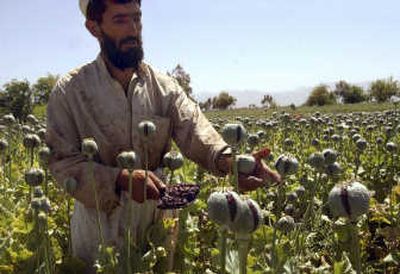Afghan poppy crop up as anti-drug plan stalls

WASHINGTON – Afghanistan will produce another record poppy harvest this year that cements its status as the world’s near-sole supplier of the heroin source, yet a furious debate over how to reverse the trend is stalling proposals to cut the crop, U.S. officials say.
As President Bush prepares for weekend talks with Afghan President Hamid Karzai, divisions within the U.S. administration and among NATO allies have delayed release of a $475 million counternarcotics program for Afghanistan, where intelligence officials see growing links between drugs and the Taliban, the officials said.
U.N. figures to be released in September are expected to show that Afghanistan’s poppy production has risen as much as 15 percent since 2006 and that the country now accounts for 95 percent of the world’s crop, 3 percentage points more than last year, officials familiar with preliminary statistics told the Associated Press.
But counterdrug proposals by some U.S. officials have met fierce resistance, including boosting the amount of forcible poppy field destruction in provinces that grow the most, officials said. The approach also would link millions of dollars in development aid to benchmarks on eradication; arrests and prosecutions of narcotraders and corrupt officials; and on alternative crop production.
Those ideas represent what proponents call an “enhanced carrot-and-stick approach” to supplement existing anti-drug efforts. They are the focus of the new $475 million program outlined in a 995-page report, the release of which has been postponed twice and may be again delayed due to disagreements, officials said.
The program represents a 13 percent increase over the $420 million in U.S. counternarcotics aid to Afghanistan last year. It would adopt a bold new approach to “coercive eradication” and set out criteria for local officials to receive development assistance based on their cooperation, the officials said.
Although the existing aid, supplemented mainly by Britain and Canada and supported by the NATO force in Afghanistan, has achieved some results – notably an expected rise in the number of “poppy-free” provinces from six to at least 12 and possibly 16, mainly in the north – production elsewhere has soared, they said.
Tom Schweich, the State Department’s top counternarcotics official and an advocate of the now-stalled plan, has argued for more vigorous eradication efforts, particularly in southern Helmand province, responsible for some 80 percent of Afghanistan’s poppy production. It is where, he says, growers must be punished for ignoring good-faith appeals to switch to alternative, but less lucrative, crops.
But, in fact, many question whether this is the right approach with Afghanistan mired in poverty and in the throes of an insurgency run by the Taliban and residual al-Qaida forces.
Along with Britain, whose troops patrol Helmand, elements in the State Department, U.S. Agency for International Development, the Defense Department and White House Office of National Drug Control Policy have expressed concern, saying that more raids will drive farmers with no other income to join extremists.